The thoughts of Chris Foster
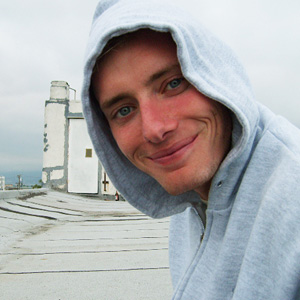
Chris Foster is an American Olympic hopeful collecting points to get on the start line of the Olympic qualifying London WCS. He is set up well as he is currently the 3rd American on the ITU Points List. He is a Project 2012 member. Chris raced 6 of 7 WCS last year and earned 2nd overall in the fastest bike segment rankings. He opened his 2011 season last weekend with a 6th place in Roatan.
Slowtwitch: You began your 2011 season last weekend with a Continental Cup in Roatan. Why there?
Chris: Well, last year I started in Chile and Argentina, and honestly the travel was a bit much. Both great races, where I had great results, but the travel was brutal. Definitely something every young ITU athlete should experience, but not something I want to do every year! Roatan was a good fit because of (relatively) easy travel, a (very, very, very) hard bike and run, and good timing date-wise.
ST: When racing in South America it’s not like you just take a flight, catch a cab and hitch a ride to the hotel is it?
Chris: Haha, no. For example I can tell you how it went in Roatan (and Roatan wasn't that bad): Get to the airport and wait in a huge line with a pile of people going to El Salvador; be told that my bike will be put on a later flight because there is no room (all while a woman with three microwaves, a washing machine, and three chickens wrapped in string has her bags checked); threaten the person at the ticket counter; speak to the manager and get an exception; eight hours later arrive in Roatan not knowing where we're staying or how we're getting there; a man tells us to follow him; we argue and negotiate how much it's going to cost to get to a place that we've never heard of; someone shows up and piles all of our things together in a pickup truck and we get in a van; worry that we've just been robbed; after an hour of being lost, arriving at a weird apartment in the jungle where my teammate and I are dumped; an hour later a woman calls on the hotel owner's cell phone and tells us that we "need to get out of there immediately, but not to tell the owner why"; wait an hour in the hot sun for a cab to come; the cab never comes; we convince the owner of the hotel to take us to the new place without arising suspicion or offending him; get lost again for an hour and finally arrive at the new hotel (still not knowing where we are in relation to the race site, host hotel, race check-in); miss packet pickup because we don't know where it is/how to get there; end up renting a 4×4 truck (manual, not sure how to use) to off-road to the race meeting the next day; nearly kill other athletes we pick up along the way (on the side of the road) because of my lack of manual skill/dangerous roads; attend race meeting. Of course there are tons of other things between the race meeting and when the gun actually goes off (changes to the course minutes before the start, negotiations about the course itself), but I'm probably already testing the attention span of the readers.
ST: The travel sounds more grueling than the triathlon itself. At Roatan you had one of the worst swims but the best bike time. Splits like that aren’t all that uncommon for you. What is going through your mind when you get into T1 knowing you’ve got work to do?
Chris: First off, my swimming splits are kind of like abstract art—not something that look good at first, but beautiful and creative in their own right! I'm more of a swimming artist, misunderstood in my own time. No, I know it wasn't good. Usually I don't know exactly how far down I am, so I'm kind of in a state of blissful ignorance. I get a strange satisfaction of being in the hunt for the pack, but I'd probably have a better sense of satisfaction sitting in and biding my time until the run. Though it's not a position I love to be in, I've certainly gotten past freaking out.
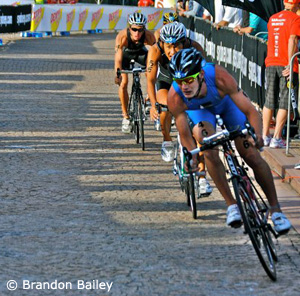
ST: What have you been doing in the pool to improve your swim effort?
Chris: Like Picasso, it's clear my swimming won't be appreciated until after I'm dead. Well, I've done lots of different things over the years. For the past two years, I did a lot of yardage—like in the 40,000-60,000 yards/week range—but this year, we're focusing a bit more on ITU-specific workouts and technique work. I think the massive mileage was important, but now we're being a bit more focused in our approach. We're doing a ton more core, and we're also using the Halo Trainer—which is awesome. Already I'm generating much more power at a lower heart rate and with faster times.
ST: Last year you finished 2nd in the best bike segment for the WCS, but I think as good of a biker you are you’re a better runner.
Chris: Thank you. Well, turning that into a question, “Do I think I'm a better runner than biker?” Yes, I do. I'm sure I'd probably show that a bit better if I wasn't so busy chasing all these guys after their unfair head start out of the water. But until I have that locked down—and I will soon, mark my words—I'll just have to play catch-up and hope I didn't burn too many matches along the way.
ST: What's your weekly mileage?
Chris: Roughly: 25,000-30,000yds swimming, 6-8 hours biking, 25-35 miles running. Obviously this changes a ton week to week, but clearly I swim way, way more than I run.
ST: On a scale of short and intense vs. slow distance, where does most of your training fall?
Chris: Well, that varies a lot as the season progresses. Right now we are in a strength phase—so that would probably fall into the “strong and long” category. Definitely nothing fast at the moment, but that will come in time. With my old coach, we did short, intense workouts almost exclusively. Lots of track sessions with mile repeats or shorter, lots of trainer/power workouts under an hour. I was a quick little monster, but I lacked staying power. I think that approach led to some good early season success, but was difficult to maintain. I'm excited to build a strong, solid base this year with the hopes of finishing strong.
ST: Many triathletes say that consistency is the key to success. What are your 'bread and butter' workouts?
Chris: That's a tough one because I just started with Siri Lindley at the end of last season, but some of my old workouts were like 6xmile descending on the track; four times through of 400m fast swim to 5 minutes hard on the bike trainer; and three by 5k fly for time in the pool. Be warned Slowtwitchers, one of those is a red herring. I'll let people debate which one it is.
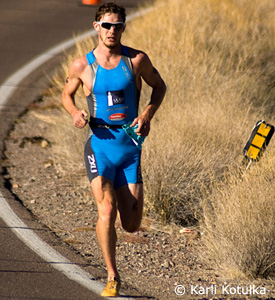
ST: A lot of pros either swam or ran in college. I know you ran in college as did Jarrod Shoemaker and Manny Huerta. On the other hand guys like Ben Collins, Cam Dye and Barrett Brandon all swam in college. What athletes do you find are having the most success now?
Chris: Well, of that bunch clearly Jarrod! Personally, I think the road for runners can be a bit harder. When they first start out, they get out of the water behind, bust ass to catch up and have an OK run split from having killed themselves for an hour and a half. On the other hand, swimmers have the satisfaction of getting out of the water quick and at least looking awesome for the crowd through T1 and maybe T2. Mentally, I would imagine this helps swimmers keep in it for a bit longer and ride out the tough years. Though at the same time, as a swimmer, I imagine it would be rough to get walked down all the time from behind on the run. Both are probably pretty painful, but I always pull for the runners—even if it's not me.
ST: You're a Project 2012 member. Can you explain to our readers what that means?
Chris: Sure. Basically it's a program from USAT that gives us support, funding, guidance, etc. The '2012' part just says that USAT believes we are potential members of the 2012 US Olympic Team. We qualify through a set of criteria that usually involve a high finish at a big (World Cup, WCS) race. It's definitely an honor that I'm quite proud to be a part of.
ST: Who is sponsoring you this season?
Chris: My sponsors include MSC Sports, SAAM of Bolles Harbor, MI, Triathlon Lab, New Performance Nutrition, Profile Design, 2XU, SIDI, Felt Bicycles, American Classic, Oakley, and USA Triathlon. A fantastic group of supporters, without which I'd probably be on the streets turning tricks.
ST: Realistically do you think professional triathletes would be able to sustain themselves without the support of sponsors?
Chris: No, I mean 98% would have to get other jobs or have wealthy parents (which would technically count as sponsors, I guess) without sponsors. My biggest sponsors totally keep me afloat. Prize money is great, but there are only a few guys who could live off prize money alone. There are a small few that get enough money from federations to live, but–at least in the US–that's like maybe four guys. All that aside, just having to buy equipment (without sponsor help) would probably put us into a cardboard box.
ST: Do you think there will ever be a day?
Chris: It's unlikely. The only way I could see it happen is if there was a huge series (like Nascar-huge) that paid most of us salaries to race. But at the same time, not everyone would be a part of the series, so there would be "pros" who still couldn't sustain. I think many of the pros on the margin make a lot of their livings either with supplemental income or basically goodwill sponsors who just think they're nice guys. It's not like the NBA where you're either a professional basketball player, or you're not. There are quite a few guys who can't cut it in races, but still consider themselves pros. For this reason alone, sponsors will always be a necessity for these folks.
ST: After racing in Pan Am cups for a long time, you stepped up to World Cups and World Series in 2010. What is the difference in both the ability of the racers and the professionalism of the race production at the different levels?
Chris: Night and day. It's like high school football versus the NFL. Not to say that there aren't good athletes racing continental cups (just like there are great high school football players), but at the WCS level, everyone is good. There is zero room for error or nerves or lack of confidence. Everyone swims really, really well, everyone is a solid biker, and everyone runs well. At a continental cup there could be two or three guys under 32min. for 10k, at a WCS race there are 25. WCS races are also a big deal—in Europe they're televised live and draw ridiculous crowds. Guys give TV interviews for major networks, get massive sponsorship deals from car companies–guys sign babies on the forehead. At continental cups, sometimes we have cars (and wild dogs) on the course, at WCS races we have helicopters overhead!
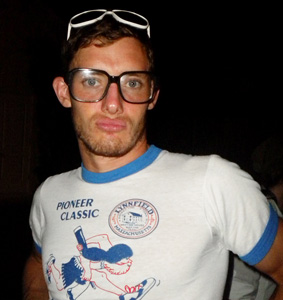
ST: Now please don't think I'm suggesting you defect but considering your abilities, have you ever thought you could profit more in the non-drafting arena?
Chris: Haha, don't worry I'm not easily offended. Clearly I would have an “easier” time racing non-draft races, but that's not why I got into triathlon in the first place! I enjoy the challenge of doing something difficult, something people think I can't. I could probably make a comfortable living doing any number of the 40 Olympic distance series that are going on this year, but I'd rather punish myself by flying all over the globe and racing the best in the world in something that is super hard for me. Like I said before, I enjoy the chase and the catch.
ST: What are you racing in 2011?
Chris: I'll be racing almost 100% ITU races in order to get into the US Olympic Trial events and make the US team. This means doing almost every WCS race and a bunch of World Cups where needed.
ST: With the Olympic Qualifying London WCS in August looming I could imagine that just getting starts in the ITU circuit it going to get much more competitive.
Chris: Yeah, in the year leading up to the Olympics everyone steps it up a notch, and you also get guys coming out of the woodwork. Crazy rumors like “Craig Mottram is going for the Olympics in triathlon!” or “Prefontaine has risen from the grave and his corpse has been doing 400m on 4:45 in the pool.” There are a bunch of guys tightly packed right now in the rankings, and I don't think anyone is going to give an inch. I've positioned myself pretty well, but I know it'll be a dogfight up until London. When that day comes, I hope to be standing on the pontoon—lined up with Gomez, Brownlee, Mottram and zombie-Prefontaine—ready to go and with my eyes on London in 2012.
You can learn more about Chris here: chrisfosterracing.com



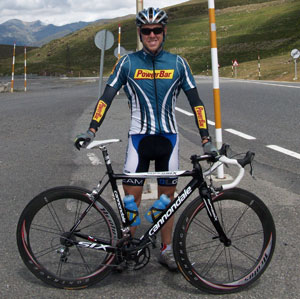
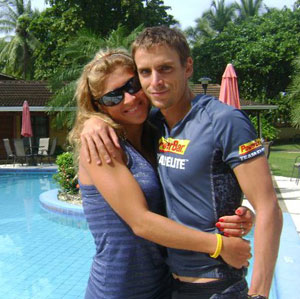

Start the discussion at forum.slowtwitch.com